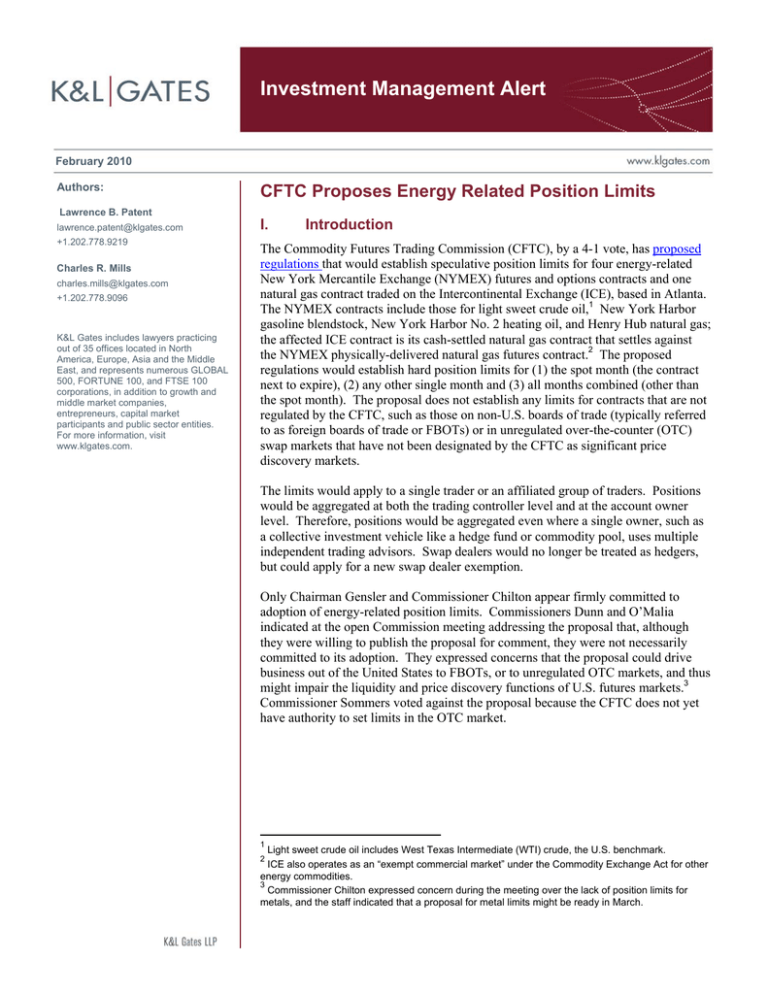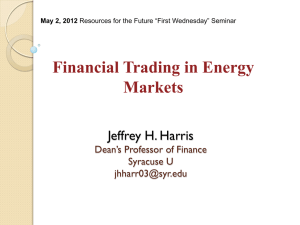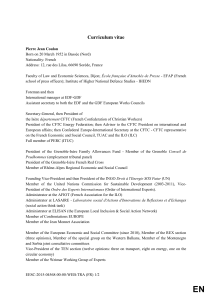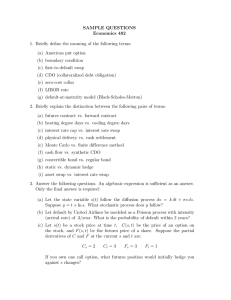
Investment Management Alert
February 2010
Authors:
CFTC Proposes Energy Related Position Limits
Lawrence B. Patent
lawrence.patent@klgates.com
+1.202.778.9219
Charles R. Mills
charles.mills@klgates.com
+1.202.778.9096
K&L Gates includes lawyers practicing
out of 35 offices located in North
America, Europe, Asia and the Middle
East, and represents numerous GLOBAL
500, FORTUNE 100, and FTSE 100
corporations, in addition to growth and
middle market companies,
entrepreneurs, capital market
participants and public sector entities.
For more information, visit
www.klgates.com.
I.
Introduction
The Commodity Futures Trading Commission (CFTC), by a 4-1 vote, has proposed
regulations that would establish speculative position limits for four energy-related
New York Mercantile Exchange (NYMEX) futures and options contracts and one
natural gas contract traded on the Intercontinental Exchange (ICE), based in Atlanta.
The NYMEX contracts include those for light sweet crude oil,1 New York Harbor
gasoline blendstock, New York Harbor No. 2 heating oil, and Henry Hub natural gas;
the affected ICE contract is its cash-settled natural gas contract that settles against
the NYMEX physically-delivered natural gas futures contract.2 The proposed
regulations would establish hard position limits for (1) the spot month (the contract
next to expire), (2) any other single month and (3) all months combined (other than
the spot month). The proposal does not establish any limits for contracts that are not
regulated by the CFTC, such as those on non-U.S. boards of trade (typically referred
to as foreign boards of trade or FBOTs) or in unregulated over-the-counter (OTC)
swap markets that have not been designated by the CFTC as significant price
discovery markets.
The limits would apply to a single trader or an affiliated group of traders. Positions
would be aggregated at both the trading controller level and at the account owner
level. Therefore, positions would be aggregated even where a single owner, such as
a collective investment vehicle like a hedge fund or commodity pool, uses multiple
independent trading advisors. Swap dealers would no longer be treated as hedgers,
but could apply for a new swap dealer exemption.
Only Chairman Gensler and Commissioner Chilton appear firmly committed to
adoption of energy-related position limits. Commissioners Dunn and O’Malia
indicated at the open Commission meeting addressing the proposal that, although
they were willing to publish the proposal for comment, they were not necessarily
committed to its adoption. They expressed concerns that the proposal could drive
business out of the United States to FBOTs, or to unregulated OTC markets, and thus
might impair the liquidity and price discovery functions of U.S. futures markets.3
Commissioner Sommers voted against the proposal because the CFTC does not yet
have authority to set limits in the OTC market.
1
Light sweet crude oil includes West Texas Intermediate (WTI) crude, the U.S. benchmark.
ICE also operates as an “exempt commercial market” under the Commodity Exchange Act for other
energy commodities.
3
Commissioner Chilton expressed concern during the meeting over the lack of position limits for
metals, and the staff indicated that a proposal for metal limits might be ready in March.
2
Investment Management Alert
II.
Position Limit Formulas And
Their Impact On Current Traders
require only about ten of the current traders in these
markets to reduce their positions.7
The proposed formulas for the limits are (a) for the
spot month for physically-delivered contracts, 25%
of the deliverable supply,4 (b) for any other single
month, 20% of the open interest for the first 20,000
contracts, plus 2.5% of open interest above 20,000
contracts, and (c) for all months combined other than
the spot month, 150% of the amount permitted in
any single month. These formulas are similar to
those in current CFTC regulations applicable to
certain domestic agricultural commodities.5 The
CFTC proposes that the CFTC staff would reset the
energy limits annually based upon these formulas,
by posting on the CFTC website by January 31, to
be effective March 1, without requiring additional
rulemaking by the Commission.
III.
Speculators tend to avoid taking positions in the spot
month, so the single month and all-monthscombined limits will be most relevant. The CFTC
estimates that, if the proposed formula for allmonths-combined were adopted and applied to
current open interest levels, the speculative position
limit for crude oil would be 98,200 contracts.6
Because one futures contract for light sweet crude
oil calls for delivery of 1,000 gallons, the position
limit represents 98.2 million gallons of crude oil,
which is greater than a single day of world
consumption and worth about $8 billion at today’s
prices. The CFTC projects that its proposal would
4
For cash-settled contracts, the spot month limit would be five
times the limit on physically-delivered contracts, but only
available to a trader that held no physically-deliverable
contracts in the spot month. NYMEX and ICE recently
adopted the same methodology for Henry Hub natural gas
contracts, beginning with February 2010 contracts.
5
Currently, the CFTC has position limits on only five types of
agricultural commodities (cotton, corn, oats, wheat and the
soybean complex, which includes soybeans, soybean oil and
soybean meal).
6
This compares to the current NYMEX position accountability
level of 20,000 contracts. Position accountability levels are
amounts that, if reached, can prompt exchange officials to
seek greater information about a trader’s strategy and
intentions. Up until 2001, NYMEX administered hard position
limits for trading in all futures and options, but now only does
so for the spot month.
Persons Affected
The CFTC’s proposal establishes different
limitations for speculators, hedgers and swap
dealers. Although the limits for speculators are
principally aimed at active traders, they also apply
to the regulated futures positions of exchange-traded
funds and index traders (sometimes referred to as
“massive passive” investors) because the proposal
treats them as speculators. The positions of
commercial end-users of physical commodities that
qualify for the current hedge exemption provided
under CFTC regulations -- such as a home heating
oil distributor or an oil exploration company -should not be affected by the proposed limits.
However, these commercial firms should be
mindful that the proposal restricts hedgers whose
positions exceed twice the speculative limit from
holding any speculative positions. Large firms that
use multiple, decentralized trading desks would
need to establish appropriate controls to account for
positions of all of their traders to avoid violating
that restriction. Positions in unregulated swaps also
would not be subject to the proposed limits. Swap
dealers, as discussed more fully below, would be
subject to new limitations on their exchange-traded
positions.
IV.
Aggregation Of Positions
The proposed energy limits differ from the current
position limits on certain agricultural commodities
because the proposed regulations establish limits
based on a trader’s aggregate positions in all
physically-settled and cash-settled contracts in the
same commodity across all exchanges that trade the
contracts. Thus, because the Henry Hub natural
gas contract is traded on both the NYMEX and ICE,
the position limits would be applied based on the
combined positions on both exchanges.
In addition, the energy proposal would aggregate
positions at the owner level, and would not permit
disaggregation for independently controlled
7
The all-months-combined limits for the other commodities
would be 8,900 contracts for gasoline, 13,100 contracts for
heating oil, and 117,300 contracts for natural gas.
February 2010
2
Investment Management Alert
accounts, as is the case for agricultural contracts.
This means that, if the CFTC’s energy proposal were
adopted (in addition to the aggregation at the advisor
level that applies to agricultural contracts and would
apply to the energy contracts), all positions held in
the name of entities such as mutual funds, hedge
funds or commodity pools would be counted against
the position limit, even if the positions had been
entered by different trading advisors acting
independently. To illustrate this point, under current
limits applicable to agricultural commodities and the
proposal for energy commodities, if you plan to start
a new pool and use outside trading advisors, the
positions that a particular advisor takes for other
pools or managed accounts are aggregated and may
limit the number of positions the advisor may enter
for the new pool. In addition, the proposed
regulations would limit the total number of positions
that a new pool can enter into, and that limit would
be the same whether the pool operator made all
trading decisions or separate, independently
operating trading advisors made the decisions.
Thus, if the energy trading limit were x, and the
collective investment vehicle employs three advisors
who each trade one-half of x, the investment vehicle
would be in violation of the energy limits, where it
would not be if agricultural contracts were involved.
Presumably, the operators of the mutual funds,
hedge funds or commodity pools would be forced to
monitor all trading done on behalf of their entities on
a real-time basis, or perhaps enlist the assistance of
the futures commission merchant (FCM) carrying
the positions to do the same, to avoid violating the
energy position limits. This could prove to be even
more burdensome if multiple FCMs are involved.8
V.
Swap Dealer Exemption
Swap dealers incur market risk by entering into OTC
transactions with commercial entities or institutional
investors. Under current CFTC regulations defining
hedging and interpretations related to risk
management, swap dealers have been able to treat as
hedges the CFTC-regulated futures and option
positions into which they enter to manage the risk
that they incur in OTC transactions. The CFTC
proposal would eliminate the hedge exemption for
swap dealers but establish a new and more
restrictive swap dealer exemption that would permit
a swap dealer to hold twice the number of positions
that a speculator may hold in a single month or in
all months combined. A swap dealer would have no
exemption for positions in the spot month.
Qualifying for a swap dealer exemption would
require an annual application and monthly reporting
of positions and related recordkeeping.9
The impact of the swap dealer exemption would be
to limit the amount of exchange-traded contracts a
swap dealer could use to hedge its risk before
exceeding the position limits. Once a swap dealer
reaches that limit, it could be expected either to
decline to enter into further OTC transactions or to
pass along its increased risks and costs for
additional swaps in the price at which it would be
willing to transact. Accordingly, although the
position limits proposed by the CFTC would not
directly affect trading in swaps, the proposed
restrictions on swap dealers’ use of exchange-traded
markets to manage their risks may cause swap
dealers either to pass along their increased risks to
their swaps counterparties (e.g., airlines, pooled
investment vehicles, pension plans) in the form of
higher pricing and more restrictive terms or to cease
entering into further swap transactions entirely once
their futures limits are reached. Either action could
negatively impact market liquidity. A swap dealer’s
qualification for this exemption would be publicly
disclosed on the CFTC’s website on an annual
basis, following at least a six-month lag.
The CFTC proposal seeks comment on specific
issues related to swap dealers. The CFTC requests
particular comment on the feasibility of a “lookthrough” exemption for swap dealers, which would
provide dealers with exemptions for positions that
offset risks arising from swaps with a counterparty
that itself would be entitled to a hedge exemption if
the counterparty hedged its exposure directly in the
9
8
The aggregation requirement under the energy proposal,
however, would not require aggregation of a pool’s positions
with those of its typical participants (e.g., limited partner,
shareholder or similar person with less than a 25% ownership
interest), unless that investor controls trading done by the pool.
The proposal requires persons who have received a swap
dealer exemption to file a monthly report with CFTC and the
relevant futures exchanges showing swap positions for
proprietary and customer accounts on a daily basis, as well as
a daily summary of dealing and trading in swaps based upon
the referenced energy contracts.
February 2010
3
Investment Management Alert
futures markets. Under a “look-through” exemption,
if the swap dealer's counterparty were a commercial
firm that could itself trade on NYMEX to hedge, but
instead decides to deal with a swap dealer OTC, then
when the swap dealer lays off the risk of that
position by taking a NYMEX position, the swap
dealer's position would not be counted against the
position limit. Adding such a “look through”
exemption would appear to foster swap market
liquidity without encouraging excessive speculation,
because it would merely recognize that the swap
dealer would be establishing a hedging position
itself on NYMEX instead of the swap counterparty
doing so.10 The CFTC’s proposal also specifically
asks for comment on whether additional information
should be required in the swap dealer exemption
application or, alternatively, whether filing
requirements should be limited and the CFTC should
rely upon special call authority to assess the merit of
swap dealer exemption requests.
VI.
CFTC Statutory Authority For
Imposing Position Limits
The CFTC relies on Section 4a of the Commodity
Exchange Act as authority to adopt energy contract
position limits. That provision states that
“excessive” speculation “is an undue and
unnecessary burden on interstate commerce,” and it
authorizes the CFTC to establish position limits that
are “necessary to diminish, eliminate, or prevent
such burden.” The CFTC’s explanation of its
proposals makes no finding that there has been
excessive speculation in any of the four commodities
for which position limits are proposed. It is
noteworthy that footnote 42 of the CFTC’s Federal
Register release announcing the proposals states that
an Interagency Task Force chaired by CFTC staff
found no causal relationship between speculative
activity and the run-up in gasoline prices during
2007-2008, an event that provided some of the
impetus for Congressional pressure on the CFTC to
10
A “look-through” exemption for a swap dealer might be
particularly warranted where, for example, a swap
counterparty uses swaps for hedging because there is no
exchange-traded futures contract for the specific commodity
involved. Because there is no futures contract in jet fuel, an
airline might prefer to use a tailored swap on jet fuel, with the
swap dealer in turn mitigating its risk in the swap transaction
by entering into a standardized crude oil or gasoline futures
contract.
impose position limits in energy-related
commodities.11
VII.
Conclusion
The CFTC’s proposal on position limits for
currently traded energy futures and option contracts
on U.S. markets could have material impacts on the
liquidity of those markets and the costs of
transacting in those markets and the related OTC
swap markets. Affected market participants must
act within the 90-day comment period if they wish
to have their views inform the public decisionmaking on this proposal. The proposal does not
occur in a vacuum, and there are likely to be
Congressional hearings on it. Some members of
Congress believe the proposal may not go far
enough, while others have expressed concern about
the export of business from U.S. markets.
That concern also is reflected in proposed
legislation that would change the regulation of OTC
swap transactions, which is working its way through
Congress. The bill that passed the House in
December would grant the CFTC new authority to
impose position limits on swaps that are found to be
significant price discovery contracts and FBOT
contracts that settle against the price of futures
traded on U.S. exchanges, but also would require
the CFTC to study the impact of any position limits
on causing business to migrate from the United
States. The threat of migration is real: only a few
days after the House passed its bill, the U.K.
Treasury and Financial Services Authority issued a
paper stating that “we do not believe a case has been
During the CFTC meeting on the proposal, some
Commissioners asked whether swap dealers should be
required to obtain information from counterparties to verify that
the counterparties are not exceeding position limits. This
issue was also discussed in a CFTC staff report released
September 11, 2008, which was described in the inaugural
issue of the K&L Gates Global Financial Markets Newsletter at
http://www.klgates.com/newsstand/Detail.aspx?publication=49
66#CTFC.
At the meeting on the proposal, CFTC staff explained that this
is not information that swap dealers may readily access, and it
is not included in the proposal.
11
Indeed, the Task Force, which included representatives of
the Departments of Agriculture, Energy and the Treasury, the
Board of Governors of the Federal Reserve System, the
Federal Trade Commission, and the Securities and Exchange
Commission, examined the crude oil market between January
2003 and June 2008, and found no direct causal evidence for
the general increase in oil prices during that time period.
February 2010
4
Investment Management Alert
made which demonstrates that prices of
commodities . . . can be effectively controlled
through the mandatory operation of regulatory tools
such as position limits, whether on exchange or
OTC.”
Anchorage Austin Beijing Berlin Boston Charlotte Chicago Dallas Dubai Fort Worth Frankfurt Harrisburg Hong Kong London
Los Angeles Miami Moscow Newark New York Orange County Palo Alto Paris Pittsburgh Portland Raleigh Research Triangle Park
San Diego San Francisco Seattle Shanghai Singapore Spokane/Coeur d’Alene Taipei Tokyo Washington, D.C.
K&L Gates includes lawyers practicing out of 35 offices located in North America, Europe, Asia and the Middle East, and represents numerous
GLOBAL 500, FORTUNE 100, and FTSE 100 corporations, in addition to growth and middle market companies, entrepreneurs, capital market
participants and public sector entities. For more information, visit www.klgates.com.
K&L Gates is comprised of multiple affiliated entities: a limited liability partnership with the full name K&L Gates LLP qualified in Delaware and
maintaining offices throughout the United States, in Berlin and Frankfurt, Germany, in Beijing (K&L Gates LLP Beijing Representative Office), in
Dubai, U.A.E., in Shanghai (K&L Gates LLP Shanghai Representative Office), in Tokyo, and in Singapore; a limited liability partnership (also named
K&L Gates LLP) incorporated in England and maintaining offices in London and Paris; a Taiwan general partnership (K&L Gates) maintaining an
office in Taipei; a Hong Kong general partnership (K&L Gates, Solicitors) maintaining an office in Hong Kong; and a Delaware limited liability
company (K&L Gates Holdings, LLC) maintaining an office in Moscow. K&L Gates maintains appropriate registrations in the jurisdictions in which its
offices are located. A list of the partners or members in each entity is available for inspection at any K&L Gates office.
This publication is for informational purposes and does not contain or convey legal advice. The information herein should not be used or relied upon
in regard to any particular facts or circumstances without first consulting a lawyer.
©2010 K&L Gates LLP. All Rights Reserved.
February 2010
5




